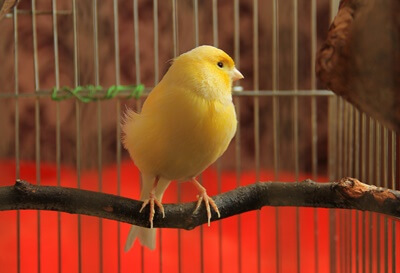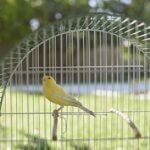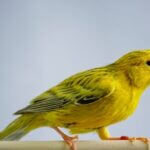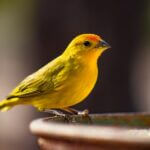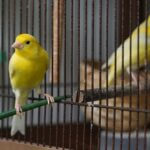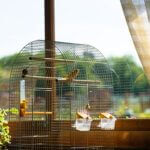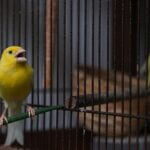Despite being prolific songbirds, there are times when canaries can’t or refuse to sing.
It’s possible that they’re unwell, depressed, or scared of something. They could be a female (and thus less likely to sing) or molting, which takes energy away from normally vocal canaries.
Sometimes, a lack of singing is due to a poor diet, too much competition with other birds or pets, or bad lighting conditions. Sometimes, songbirds don’t sing because they’re too young or are unsure how.
If so, you can teach your canary to sing by exposing it to other songbirds or by playing music that includes canary songs. If your canary is too young to find its voice, talk and sing to it.
How Long Does It Take For A Canary To Sing?
Most canaries begin singing when they’re about 3-4 weeks old.
During this early stage of song development, chicks begin to tone in on the warbles of their parents. Through listening and practice, they’ll memorize notes.
At this point, a baby canary’s singing tends to be subtle and less frequent.
That changes at about 6 months of age. Here, the fledglings begin to refine their song into what will eventually become their adult song. You’ll recognize classic notes and find that your canary’s melody becomes far more defined.
According to Behavioral and Neural Biology, it takes about 8-12 months for a canary to become sexually mature. For males, it’s this point where they fully develop their adult song. In females, they may sing more clearly than before, but they may never sing regularly or have a defined melody.
Once a male canary achieves a stable song, it maintains it throughout the mating season. That’s why you’ll find that canaries sing loudest and most frequently during the spring.
Canaries usually enter the molting phase after the breeding season is over and start to shed their feathers to grow new ones.
Like most songbirds, canaries sing less (with poorly refined songs) during this period. In most cases, they cease to sing entirely because a lot of energy is used during molting.
As the molting season draws to a close, canaries begin to sing again and gradually increase their singing intensity as the mating season approaches.
How Do I Get My Canary To Sing?
Canaries are natural songbirds that can sing impressively.
However, their singing largely depends on their well-being. For this reason, ensure your canary receives the right care and attention.
There are times when your canary won’t sing, can’t sing, or doesn’t know how to sing.
Let’s explore these factors and what you can do to encourage a reluctant canary to sing:
Appropriate Diet
Canaries that aren’t well-fed are less likely to sing. So, ensure your pet canary receives a nutritious diet.
Canaries mainly subsist on a diet of seeds, such as:
- Millet
- Flaxseed
- Rapeseed
- Hulled oats
However, it’s recommended to supplement your canary’s diet with fresh fruits and leafy green vegetables.
The best fresh treats you can add to your canary’s diet include:
- Apples
- Bananas
- Melons
- Raspberries
- Broccoli
- Grapes
- Collard Greens
- Cauliflower
- Dandelions
- Pineapples
- Tomatoes
Ensure your canary has a regular feeding schedule, so it knows when it’ll eat during mealtime. Likewise, ensure the cage has fresh water to quench its thirst whenever necessary.
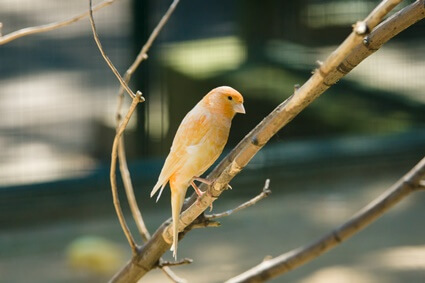
Right Cage Setup
Having the right cage is vital to your canary’s well-being. Ideally, you should have a spacious cage for your canary to fly around in.
Ample exercise is important to a canary’s health. If it’s unable to stretch its wings, flutter from place to place, and fly certain distances, it may grow weak or depressed.
As a minimum, your canary’s cage should be 30 inches wide and 16 inches tall to allow enough room for movement. Having a large cage gives it room for any furnishings, such as:
- Feeders
- Water bowls
- Bird toys
- Enrichment items
Likewise, ensure that your canary’s enclosure is in a quiet position that doesn’t experience a lot of activity. If you set up the cage in a noisy environment, your canary will likely get anxious and agitated, making it reluctant to sing.
Clean Cage and Furnishings
Canaries are extremely sensitive to air contaminants in their environment. Avoid using Tefal (non-stick cookware), candles, colognes, hair spray, paint, and bleach around canaries.
Wipe down everything with bird-safe disinfect at least twice a week to remove any food remnants, droppings, and other waste.
Clean up its feeders after meals and replace its drinking water every day.
Cage Cover At Night
Canaries need a minimum of 12 hours of uninterrupted sleep to stay healthy. So, creating the right environment for your canary to fall asleep during the night is important.
Besides keeping your canary’s cage in a quiet room, cover its cage with a blanket or other opaque material at night. Creating a dark environment in the cage signals its body clock that it is time to sleep.
Bird Bath
Canaries enjoy taking a bath. Not only does this help them cool off and refresh themselves, but it also gets rid of any dirt and debris accumulated on their bodies.
So, provide your canary with a birdbath at least twice a week.
Canaries Singing
According to Behaviour, canaries are songbirds that sing to mark territory and attract mates. Even so, some canaries may take longer to develop their song, especially after the molting season is over.
The best approach is to play recordings of other canaries singing, as the sounds are instantly recognizable to a canary. For this reason, it’ll be able to memorize and imitate them.
Sing Together
Canaries make great companions because they have a natural affinity for humans and enjoy interacting with them. Consequently, you can train your canary to sing if you sing along with it.
Schedule time each day to spend time with your canary. Play music that you can sing along to together.
Canaries naturally develop their song on their own as they mature sexually. Therefore, your canary should have little trouble singing as long as it’s well-fed, properly cared for, and not ill.

